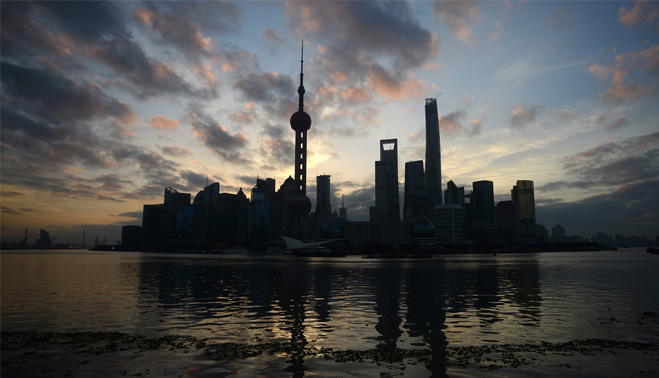![]() Home > World Business
Home > World Business
China Has a $385 Billion Invite-Only Stock Market That's Booming

PHOTO: Johannes Eisele/AFP via Getty Images
![]() April 13th, 2016 | 08:38 AM |
April 13th, 2016 | 08:38 AM | ![]() 2023 views
2023 views
China
China’s leaders want a “multi-tiered capital market” as a way for the country’s cash-hungry companies to raise funds. One of those tiers is a little-known over-the-counter venue where trades in Evergrande Football Club made it more valuable than Manchester United Plc.
Founded in 2012, the National Equities Exchange and Quotations market was home to some 5,000 companies with a total capitalization of 2.5 trillion yuan ($385 billion) at the end of last year, data from consultancy Zero2IPO show. Those figures are poised to double, Zero2IPO says, as businesses are lured to NEEQ’s less stringent requirements and soaring valuations, as well as continuing uncertainties over the country’s system for taking companies public.
The trend seems to sit well with policy makers, who are still dealing with the fallout from last summer’s $5 trillion stock rout and the botched introduction of market-wide circuit breakers in January. Officials last month played down a plan to ease China’s initial public offering process and instead emphasized the multi-tiered approach. To China’s growing companies, that increases the allure of OTC venues such as Beijing’s NEEQ that can offer an easier path to reaching investors, though in a less-regulated and potentially more volatile trading environment.
“If it’s done right, NEEQ can be the most market-oriented board in China,” said Dennis She, chief executive of ET Solar, a Chinese solar-farm developer seeking to list on NEEQ. The company last year gave up a plan to IPO in the U.S. and aims to go public on the Shanghai Stock Exchange. “It’s not a retail market and it has some requirements on investors.”
Private Market
In a country where bank loans are still the main source of funding, NEEQ offers a way to raise capital without getting stuck in the line of more than 700 firms waiting to go public. Some companies have raised considerable sums on the market, and its regulator is considering smoothing the path for listed entities to move from NEEQ to China’s public venues.
While stock exchanges are open to anyone, over-the-counter markets operate more like private clubs. They can pick and choose their participants, who are overwhelmingly institutional investors in contrast to the high proportion of retail traders on China’s public bourses.
NEEQ’s haul of listed companies is almost twice the number of publicly-traded companies in China, though because the firms are generally smaller, the total capitalization of the Shanghai and Shenzhen exchanges is more than 15 times greater, at about $6 trillion, according to data compiled by Bloomberg.
Even though NEEQ is growing rapidly, Shen Lingkun, a Beijing-based analyst at Zero2IPO, said doubts remain about how effective it as a viable, and safe, trading venue.
“Overall the market is not that efficient due to a lack of liquidity, and stocks see violent swings in prices,” she said by e-mail. “Some companies are raising money blindly or with impure motives; there’s more to be done to improve the market’s regulations.”
CSRC Role
The market is under the direct supervision of the China Securities Regulatory Commission, in contrast to the more than two dozen OTC equity markets in the country that are operated by local governments. Visits in 2014 to some of those venues revealed that they were almost deserted, and most remain plagued by poor corporate disclosures. While NEEQ can list companies from across the country, the local markets can only take corporations from their region.
The benefits of having the CSRC as overseer showed when the body said in November that it is studying a way to allow NEEQ-listed companies to transfer to the ChiNext venue in Shenzhen, a step that would increase its appeal to entities that aim to land on the public markets.
Among NEEQ’s successes, private equity firm Tongchuangjiuding Investment Management Group Co. has raised 15 billion yuan on the venue since April 2014, giving it a market value of about 100 billion yuan, according to the company. Guangzhou Evergrande Taobao Football Club Co., in which Jack Ma’s Alibaba Group Holdings Ltd. owns a 40 percent stake, was valued at 21.8 billion yuan after its first transaction on NEEQ, surpassing Manchester United to become the world’s most valuable football club, Xinhua News Agency reported on March 8.
Innovation Works, a startup incubator founded by Kai-Fu Lee, the former China head for Google Inc., completed its listing on NEEQ in February. Companies waiting to list on NEEQ include Citic Capital, the private equity arm of state-owned conglomerate Citic Group Corp.
More Scrutiny
The CSRC recently increased its scrutiny over NEEQ. The securities regulator asked brokerages to ensure that only qualified investors participate at NEEQ, the 21st Century Business Herald reported last month, citing a document it obtained.
In February, CSRC showed it would enforce trading behavior at the venue, limiting Guotai Junan Securities Co.’s market-making business for three months after the firm allegedly “disrupted market order” at NEEQ by submitting orders that significantly deviated from market prices.
The decision to ease off plans to change China’s IPO system came amid worries that a new system could weigh on already-fragile investor sentiment after last year’s stock-market rout wiped $5 trillion in value, and a failed introduction of market circuit breakers in January triggered fresh crises.
Instead, China will press ahead with building a multi-tiered capital market, Premier Li Keqiang told reporters at his annual press conference in Beijing on March 16. Li didn’t mention a new IPO registration system in his annual work report for the first time in three years.
Source:
courtesy of BLOOMBERG
by Bloomberg News
If you have any stories or news that you would like to share with the global online community, please feel free to share it with us by contacting us directly at [email protected]